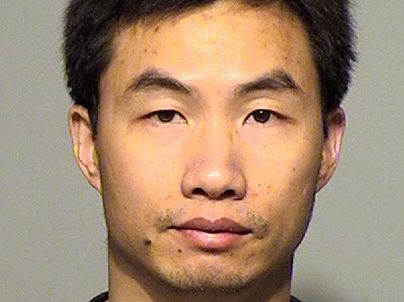
Zhao Huajun. Photo: AP
A Chinese researcher was sentenced on Tuesday to time served plus two years of probation on charges stemming from the theft of a cancer research drug from a Wisconsin medical school.
Zhao Huajun, 41, was initially accused of stealing three vials of a possible cancer-fighting drug from the Medical College of Wisconsin in February. Prosecutors said he also downloaded accompanying research in hopes of passing it off as his own in China.
But Zhao pleaded guilty last month to a reduced charge of accessing a computer without authorisation. He acknowledged logging into the school’s servers after he was suspended, downloading research data and deleting the school’s files.
Federal guidelines called for a sentence of six to 12 months. But US District Judge Charles Clevert agreed with the defence that Zhao be sentenced to time served for the 4½ months he already spent behind bars.
Clevert noted that even Zhao’s former boss at the medical college expressed his admiration and respect for Zhao’s work. The judge also cited Zhao’s clean record and sterling scientific reputation.
“He has been incarcerated away from his family and he has not been able to continue the research that consumed his life,” Clevert said.
Before handing down the sentence, Clevert heard from Zhao’s wife and several members of his church. All described him as an honest, hardworking man who lived for his cancer research. If he crossed any legal line, they said, it was only because he cared so much about his research that he wanted to safeguard it.
Zhao told the judge the same thing, saying he never intended to profit from the work and only wanted to make sure it was in responsible hands.
“Please consider the possible damage to cancer research if the world views me as a criminal instead of as a dedicated research scientist,” he said.
Although Zhao wasn’t sentenced to prison time, his residency status in the US as a Chinese citizen is now in question. He was taken from the hearing directly into the custody of US Immigration and Customs Enforcement officials, who will decide the next steps.
School scientists were studying whether the drug compound C-25 could help kill cancer cells without damaging healthy ones. The compound is still in early stages of research and has not advanced to clinical testing.
After three vials of the drug disappeared from a researcher’s office, school security video showed that Zhao was the only person who entered the office that day. The school suspended him and confiscated his laptop, external hard drive and thumb drive.
Zhao told the judge on Tuesday he panicked when the hardware was taken because he was worried something would happen to his data, so he accessed the school’s servers to download it.
He didn’t say why he deleted those files from the school’s servers. His defence attorney, Michelle Jacobs, said Zhao wasn’t thinking clearly at that moment, but he felt so guilty the next morning that he emailed his boss offering to return the data.
The school recovered the files on its own. The missing vials have never been found.
Several Medical College of Wisconsin officials attended the hearing but declined to speak before the sentencing.
Federal authorities who searched Zhao’s home had found a receipt for shipment of a package to Zhao’s wife in China, along with two airline tickets from Chicago to China.
They also found an application to the National Natural Science Foundation of China seeking research funding for C-25. In the application, Zhao wrote in Mandarin that he discovered the compound himself and was seeking funding to continue his research in China.
Federal prosecutor Stephen Ingraham didn’t raise either issue at sentencing. After the hearing, he acknowledged both issues were “troubling,” but said he couldn’t prove Zhao took the vials or actually intended to profit from them.
|
|
||
 |
| Touched | Sympathetic | Bored | Angry | Amused | Sad | Happy | No comment |
Rhythm Media Group is a multi-media company, operating a US-based Chinese daily newspaper, The China Press, and the paper's website - uschinapress.com (which has mobile-app version), as well as a Beijing-based English website Sino-US.com. The group boasts 15 branch offices across the US, and a number of cultural centers focusing on culture-related business in the North America, Chinese mainland, Hong Kong and Taiwan.Launched in September 2012, the Sino-US.com is designed to serve as a bridge between China and the US, and to keep its readership inside or outside China better informed by providing news and insights on China's current affairs, culture, life, business, people and sports.
|
|